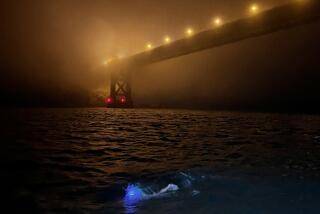Schwab’s Alone in Quest to Complete Sailing Race
- Share via
For 3 1/2 months, the only company Bruce Schwab kept was an occasional pod of dolphins, a school of leaping tuna and an albatross he named Albert, which followed his sailboat for days.
His most pressing concern, as it was for 19 other competitors in the Vendee Globe around-the-world solo-sailing race, was to safely navigate the weather he encountered.
Seven entries dropped out after the race began Nov. 7 at Les Sables d’Olonne, France. And while Schwab was off the tip of Africa, wild crosswinds whipped up waves so large that they made his 60-foot vessel look like a toy in a child’s bath.
“I tried to dodge [the storm] and it backtracked on me and I just got pummeled,” he said this week via satellite phone, as he dodged freighters and fishing boats in the Bay of Biscay. “I wasn’t racing at all at that point. I was just trying to survive.”
The Oakland sailor did more than survive. Around dawn today in France, his low-budget vessel, Ocean Planet, was expected to dock in Les Sables after 110 days of traveling nonstop more than 25,000 miles through the Atlantic, Pacific and Indian oceans. He figured to finish ninth, but more significantly he would become the first American to complete the race -- and the second to circumnavigate the planet alone and without stopping.
Frenchman Vincent Riou was declared the Vendee Globe winner Feb. 2, in a race-record time of 87 days 10 hours 47 minutes and 55 seconds. Four sailors are expected to finish in the next several days.
For Schwab, the return to civilization and its luxuries -- “I’m really looking forward to a good chili relleno but I guess I’m not going to get that in France,” he said wearily -- is something he often dreamed of while at sea.
But those dreams were interrupted by a reality he knew he would eventually face: “Now I hope that we can find a way to pay for it all,” he said.
Schwab, 44, sailing against European rivals who enjoy support from fans and corporations, was the only entry without the backing of a major sponsor.
He solicited funds mostly from individuals but also used his credit card and took out nearly $500,000 in loans to pay for rigging, sails, communications equipment, a solar-powered electrical system, radar and provisions. He could not afford backup equipment or insurance.
Regardless, he considers the experience worth every borrowed penny. The Vendee Globe represents a culmination of sorts, something he built toward with numerous challenges, including a 1996 triumph in the single-handed division of the Trans-Pacific Yacht Race from Los Angeles to Honolulu, and a fifth-place finish in the 2002 Around Alone global circumnavigation.
Unlike Around Alone, which is run in stages and includes lengthy layovers, the Vendee Globe is nonstop and considered by some to be an ultimate test of human endurance.
Sleep comes in 20-minute cat naps. Prolonged stretches beyond sight of land and without company can cause the mind to play tricks on sailors, who find themselves talking to creatures such as Albert the albatross, one of several seabirds to have joined Schwab for parts of his journey.
The only other American to have attempted the Vendee Globe was Minnesota’s Mike Plant, who was disqualified during the 1989-90 race for assistance he received after losing control of his boat off New Zealand.
Fewer than 200 people are believed to have solo-piloted vessels around the world, compared with the nearly 2,500 people who have successfully climbed Mt. Everest since 1922.
The first recorded solo circumnavigation, which included layovers, was by Joshua Slocum, whose three-year journey began in 1895.
Dodge Morgan of Harpswell, Maine, became the first American to sail nonstop around the world. He did so in 150 days in 1985-86.
The first person to accomplish the task nonstop was British sailor Robin Knox-Johnston, who took 313 days to do so aboard a 32-foot ketch in 1968-69. Sustaining himself largely on tinned beef and rainwater he collected with his sails, he was the only finisher among nine entries in the inaugural Golden Globe challenge. The race resurfaced in 1989 as the Vendee Globe, founded by Philippe Jeantot and generally held every four years.
More recently there have been individual assaults on the around-the-world speed record.
Ellen MacArthur, 28, of Derbyshire, England, earlier this month became the fastest to solo-sail around the world. Guiding a 75-foot trimaran -- a vessel with three hulls that usually is either not allowed or placed in its own class in races -- she covered 27,354 miles in just less than 72 days, beating by 32 hours a record set a year earlier by French sailor Francis Joyon.
Vendee competitors are restricted to 60-foot single-hull sailboats, which are outfitted with plenty of storage for freeze-dried foods, heated cabins, water distillers, satellite phones and computers that enable sailors to keep an eye on weather patterns and send and receive e-mail.
Throughout the last week, for example, Schwab relayed messages about his “rather hectic return to civilization,” caused by heavy boating traffic, frequent rain squalls and hailstorms, and winds that were either too light or blowing in the wrong direction, delaying his progress and interrupting an already sporadic sleeping pattern.
“I guess I’m not going to waltz on in without having to work for it,” he said. “The weather, once again, has made a statement about who’s in charge -- and it’s not me.”
At the time, he wasn’t aware of a surprise waiting for him at the finish line: his mother carrying a piping hot plate of chili relleno.
More to Read
Sign up for The Wild
We’ll help you find the best places to hike, bike and run, as well as the perfect silent spots for meditation and yoga.
You may occasionally receive promotional content from the Los Angeles Times.






